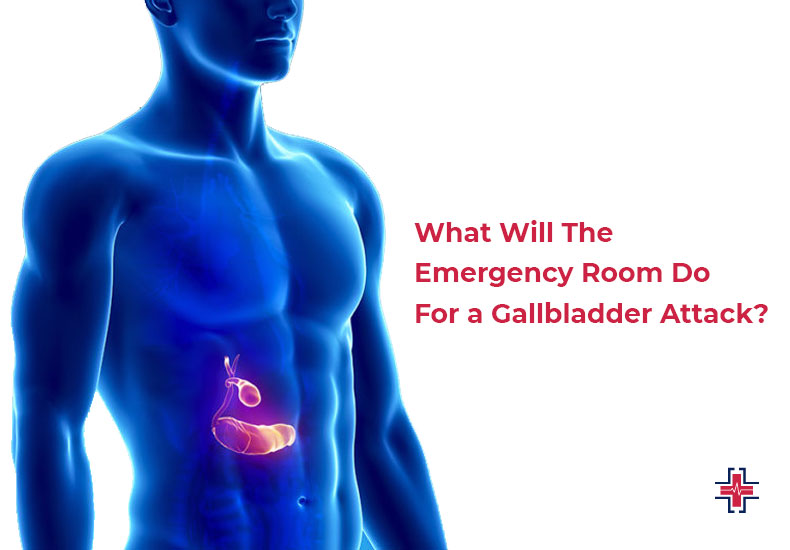Attacks on the gallbladder rank among the most frequent causes of ER visits. Patients frequently leave with orders to schedule emergency gallbladder surgery once doctors determine if they need it. Emergency surgery is usually appropriate for patients who are at risk of complications or recurrent attacks. The patients are better able to speak out for themselves and prevent surgical delays the more educated they are.
Knowing when to visit the hospital in case of a gallbladder attack is crucial. When gallstones—solidified fragments of digestive fluid—get lodged in the tube that joins the pancreas and gallbladder, gallbladder attacks happen. The most typical symptom is a sharp pain in the upper right side of the abdomen, or occasionally under the ribs in the middle.
While not all gallstones require medical attention, you should visit the hospital if you have a fever, are throwing up, or have severe upper abdominal discomfort that lasts more than two hours.
This article will explain what a gallbladder attack is, when one may occur, and why receiving care at a hospital may be necessary.
What is Gallbladder Pain?
The sensation of pain in the gallbladder is unlike any other abdominal ache you may have experienced. A sudden, severe pain in your upper right abdomen could occur. You can feel as though a knife is being used to cut you. It hurts a lot and is always there.
Biliary colic—a term for the mildest and most prevalent kind of gallbladder pain—is an intermittent pain syndrome. The typical symptoms for a patient are a constant, strong gripping or gnawing pain in the upper right abdomen, close to the rib cage, that can also radiate to the upper back.
What is The Gallbladder?
A little pouch with connections to various areas of your digestive tract is your gallbladder. Bile, a substance produced by your liver to aid in the breakdown of fats, is stored and released by it. In the upper right section of your belly, directly beneath your liver, is where your gallbladder is situated. The biliary tract, which is made up of several bile ducts, is where your gallbladder releases bile. Bile is transported from your liver into your small intestine by this system, which resembles a pipe.
The fluid that helps with digestion, bile, is stored in the gallbladder. Bile is continuously produced by the liver and kept in the gallbladder until you eat. The muscles surrounding the gallbladder contract and release bile when you eat because the stomach releases a hormone.
During digestion, bile aids in the breakdown of fat. It is composed of many elements, such as water, bile salts, and cholesterol. Certain chemicals, like cholesterol, can congregate and form gallstones that can be as big as a golf ball or a grain of sand. Gallstones can affect up to 15% of the population, although most never cause problems.
What Does Gallbladder Pain Feel Like?
Gallbladder pain can occur anywhere. Since your gallbladder is situated in your upper right abdomen, pain in this region is more likely to occur. Chest pain or upper mid-abdominal pain are other possible symptoms.
Pain referred from the gallbladder may be felt. Referred pain is the term used to describe when pain in one area of your body is brought on by pain in another. Back and right shoulder discomfort may become associated with gallbladder pain.
Doctors Should Be Consulted If You Experience These Warning Signs
Even while the majority of gallbladder attacks do not pose a serious threat to life, it is crucial to know our bodies and the early warning indicators of possible health problems. For a gallbladder attack, you should visit the hospital right away and get medical assistance if you encounter any of the following five warning signs:
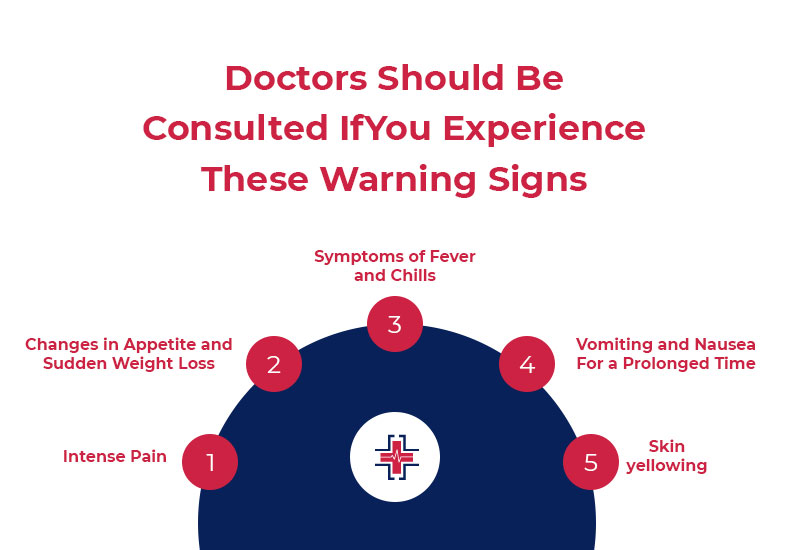
Intense Pain
A classic indication of a gallbladder attack is excruciating pain. Most often, this pain appears on the upper right side of the abdomen. There are moments when the right shoulder or back experiences radiating agony. It often begins abruptly and can go on for a few hours.
Gallstones, which are hard deposits that form in the gallbladder, cause this pain when they obstruct the cystic duct that leads from the gallbladder. Such a blockage may require immediate surgery if it causes acute cholecystitis, an gallbladder inflammation.
Changes in Appetite and Sudden Weight Loss
Even while many people want to lose weight, abrupt and inexplicable weight loss—especially when it’s accompanied by changes in appetite—may indicate a gallbladder issue.
Unintentional weight loss results from poor fat digestion, which is a complication of gallbladder dysfunction. Furthermore, gallbladder problems may reduce appetite by making some foods, particularly fatty ones, less appetizing.
Symptoms of Fever and Chills
Abdominal pain coupled with a fever and chills may be a sign of acute cholecystitis, a gallbladder attack consequence. This illness suggests that the gallbladder is inflammatory, typically as a result of a cystic duct obstruction. If the inflammation is not treated right away, it may result in a dangerous infection.
When a person has both chills and a high fever, their body is fighting an interior infection, therefore they should see a doctor right once.
Skin Yellowing
Jaundice, a yellowing of the skin or the whites of the eyes, is a sign of liver issues or a blockage in the bile ducts. Bile, a necessary digestive fluid, cannot pass through gallstone-clogged bile ducts and accumulates in the blood, leading to jaundice. This symptom, which could indicate a serious liver or gallbladder problem, has to be treated immediately.
Vomiting and Nausea For a Prolonged Time
Vomiting and nausea are signs of many diseases, but when combined with other symptoms, they point to gallbladder attacks. Recurrent episodes of vomiting and dysphagia may indicate a serious gallbladder problem or digestive obstruction.
Seek prompt medical assistance and don’t disregard these symptoms, particularly if they persist for more than a few hours.
Gallbladder Attacks: What Causes Them
Recognizing and effectively controlling gallbladder attacks begins with an understanding of their underlying causes. Even though the human body might occasionally produce perplexing symptoms, a gallbladder attack is never something to disregard. In this section, we examine the main causes of gallbladder attacks.
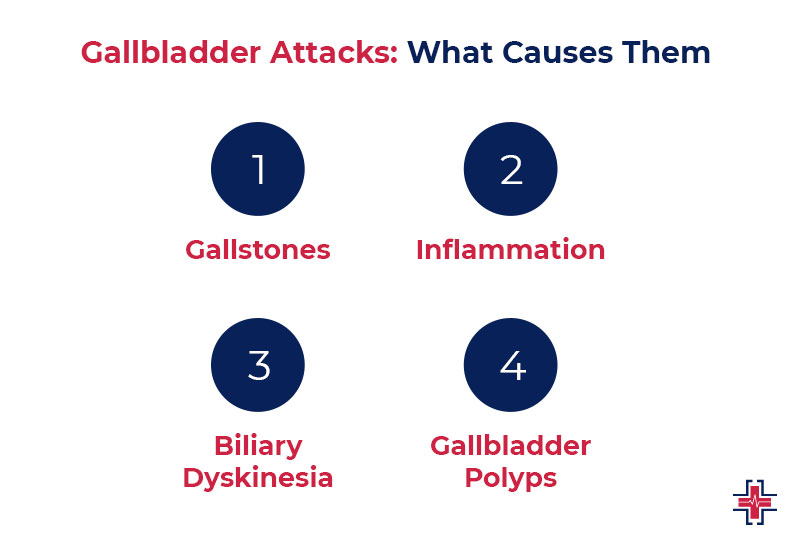
Gallstones
Developing gallstones is possibly the most common cause of gallbladder attacks. These are deposits that grow inside the gallbladder and are hard like pebbles.
When there is an imbalance in the components of bile, the digestive fluid that the liver produces, gallstones can form. Remarkably, 5.9–21.9% of adult Asians experience these kinds of events.
The cystic duct, which is the tube that transports bile from the gallbladder to the small intestine, becomes blocked when these stones form a gallbladder attack. The majority of symptoms associated with a gallbladder attack are triggered by this obstruction, which can cause excruciating agony. It should be mentioned that kidney stones and gallstones can have similar symptoms, thus there are some additional warning indicators to be aware of.
Inflammation
The word for the inflammation of the gallbladder is acute cholecystitis. Usually, the cystic duct obstruction caused by a gallstone results in this inflammation.
Acute cholecystitis can sometimes cause chills or a fever in addition to discomfort. The gallbladder may fill with pus if treatment is delayed, resulting in a serious and perhaps fatal illness.
Fortunately, avoiding high-cholesterol meals and adopting a healthy weight and lifestyle can help prevent acute cholecystitis.
Biliary Dyskinesia
A less well-known but important cause of gallbladder attacks is biliary dyskinesia. It describes the gallbladder’s aberrant motility or operation. Under this situation, the gallbladder either extracts the bile excessively forcefully or incorrectly.
The end effect is like having a blockage without any actual obstruction, such as gallstones. The symptoms may resemble those of more prevalent gallbladder issues, therefore accurate diagnosis is essential.
Gallbladder Polyps
Growths known as gallbladder polyps arise from the lining of the gallbladder’s walls. Although the majority of these polyps are benign (not malignant), a small number could have major consequences. The symptoms of a gallbladder attack may arise from these growths interfering with the gallbladder’s ability to operate when they get large.
Imaging techniques can reveal these polyps even though their precise etiology is uncertain. If they pose a concern, gallbladder surgery could be advised as a preventive step.
A Gallbladder Attack When To Go To ER
Even while minor gallbladder attacks can occasionally be treated at home, there are specific circumstances that call for emergency medical care.
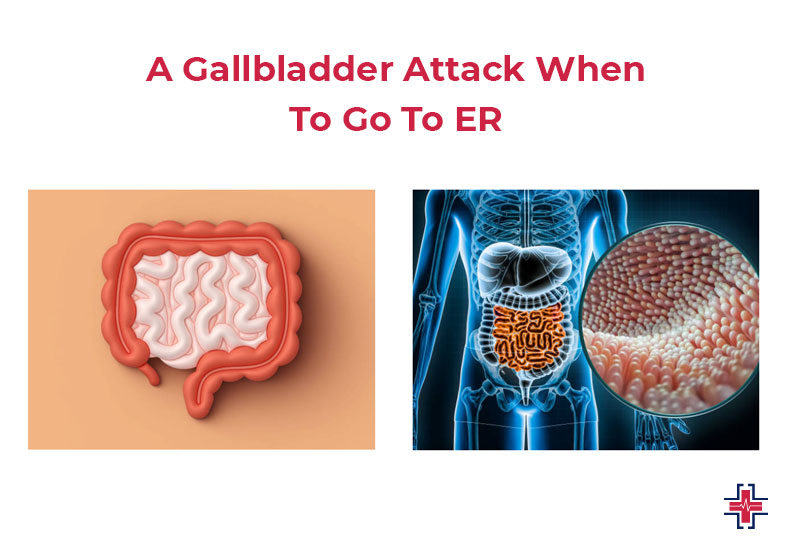
You ought to think about visiting the hospital if:
- You feel excruciating, ongoing stomach ache that won’t go away.
- Jaundice, chills, or a high temperature accompany the pain.
- You see black urine and stools that are light in color.
- You also have chest pain or difficulty breathing in addition to the symptoms of a gallbladder attack.
Can Stress Cause a Gallbladder Attack
Inhibition of gall bladder emptying brought on by stress may interfere with energy absorption, making it difficult for subservient animals to convert energy-rich diet into mass gain. These findings are consistent with alterations in gall bladder function that occur before cholesterol gallstones form in humans and other species.
Additionally, the development of metabolic syndrome is made more likely by conditions associated with it. In animal models, social stress and other types of stress can cause cholestasis by preventing the gallbladder from contracting because of elevated sympathetic activity brought on by corticotrophin realizing factor.
How Long Does a Gallbladder Attack Last?
These attacks typically persist for a very long period. As long as an attack is ongoing, nothing can be done. The pain should subside after the gallstone passes.
Attacks on the gallbladder can be so painful that they require emergency room visits. That’s good news because severe pain necessitates an assessment. Gallbladder attacks can have symptoms similar to appendicitis, heart attacks, and ulcer perforations, among other dangerous medical diseases.
Even if you have gallstones, therapy is not necessary if you have never had discomfort in your gallbladder. A patient should be evaluated and may wish to avoid gallstones if they have experienced one or two bouts.
Do Gallstones Have a Fatal Outcome?
Gallstones do not pose a hazard to life. But they can also result in some potentially lethal side effects. Fortunately, this is an extremely rare occurrence.
If a big stone obstructs the bile channels after it exits the gallbladder, it might lead to an infection in the bile and gallbladder ducts. Severe pain and infection may result from it.
In this situation, you might require rapid assistance. Seek further information and medical advice from the ER of Mesquite if you’d like.
Care and Treatment Of Gallbladder Attack
A gallbladder attack can be a terrifying and extremely painful experience. Gallstones or other gallbladder problems frequently cause these episodes, which cause excruciating upper abdominal discomfort, nausea, and vomiting.
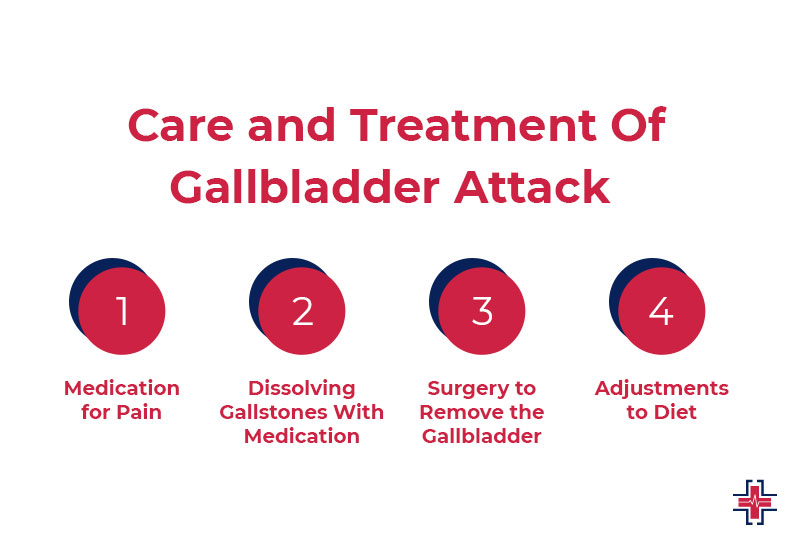
Thankfully, there are a number of therapies available to reduce gallbladder attack symptoms and deal with their underlying causes. This section will examine some of the most popular therapies and offer a succinct synopsis of each.
Medication for Pain
An essential part of treating gallbladder attacks is pain control. Severe stomach discomfort during an attack can be lessened by over-the-counter pain medicines like ibuprofen or prescription drugs.
To be sure a medicine is safe and appropriate for your situation, you must speak with a healthcare provider before taking any.
Dissolving Gallstones With Medication
Gallstones may eventually dissolve with the prescription of ursodiol or chenodeoxycholic acid for those who are not good candidates for surgery. These drugs are usually prescribed for cholesterol-containing gallstones that are smaller in size.
This method may not work for all gallstone types, and effects may take months or even years to manifest. Therefore, it is rarely advised to use this type of treatment.
Surgery to Remove the Gallbladder (cholecystectomy)
A cholecystectomy, or surgical removal of the gallbladder, may be advised in cases of severe or recurrent gallbladder attacks. One of the best strategies to stop attacks in the future is to follow this process.
Thankfully, laparoscopic surgery is frequently used to remove the gallbladder, which shortens recovery periods.
Adjustments to Diet
Dietary modifications are frequently part of the long-term therapy of gallbladder attacks. Limiting the consumption of oily and fatty meals can help stop attacks in the future. You can receive individualized advice on a low-fat diet from a nutritionist or healthcare specialist.
Conclusion Regarding When To Visit A Hospital For Gallbladder Attacks
It is essential to identify and address the symptoms of a gallbladder attack. Acute cholecystitis, which may necessitate gallbladder surgery, is one of the problems that can arise from gallbladder attacks if they are not treated.
One typical cause of these attacks is the obstruction of the cystic duct, sometimes due to gallstones. Making your health a priority by being informed and getting help as soon as possible will help to avoid problems and guarantee your wellbeing.
If you have any symptoms or questions, you should always speak with a medical professional. Early intervention can significantly improve your health and well-being. Get in touch with ER of Mesquite right now to find out more about your alternatives for relief and emergency gallbladder surgery.
